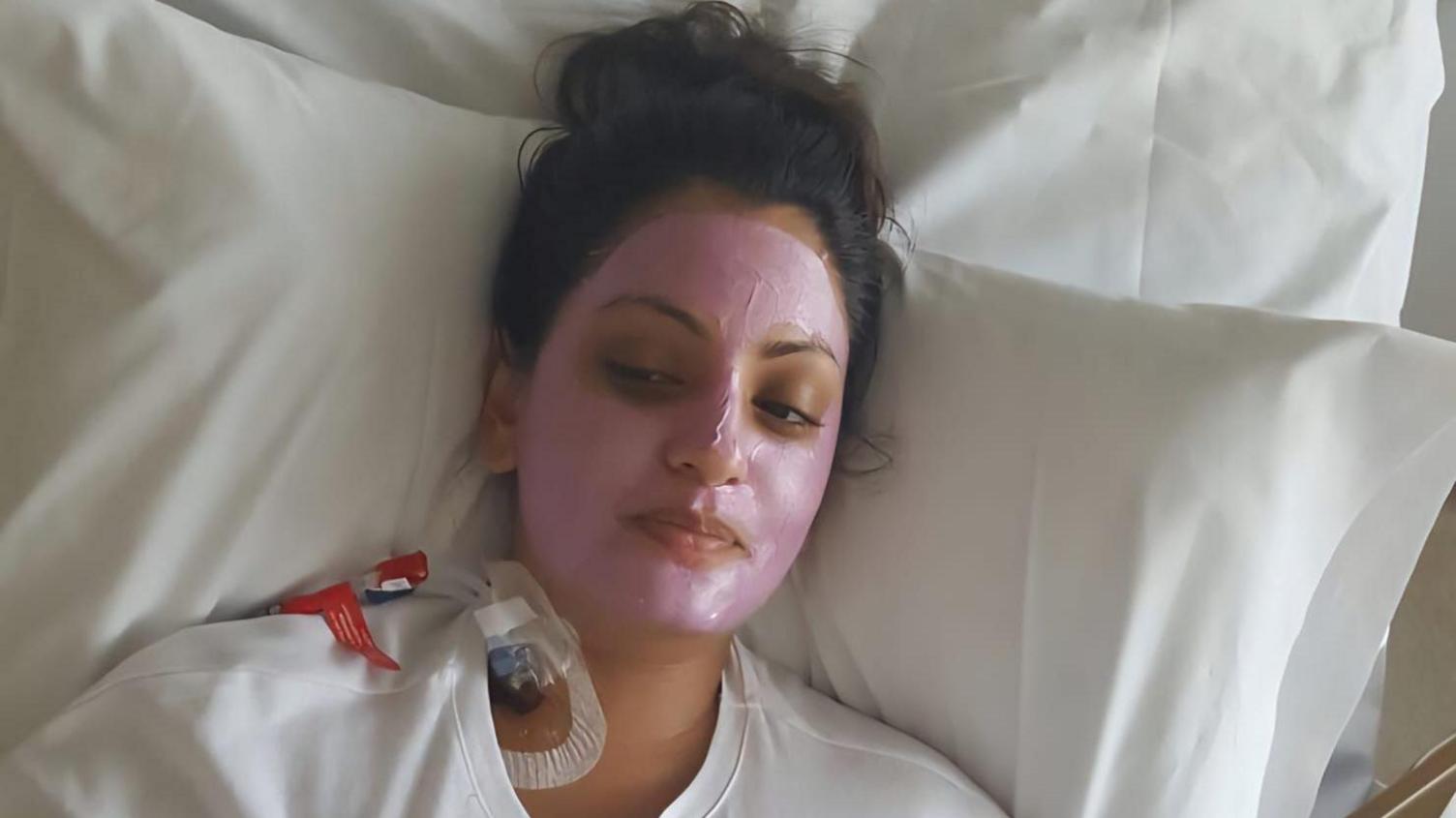Stop telling me to lower my cortisol - it's making me stressed!
- Published

It could apparently change the shape of my face, add pounds to my midriff, and even make my hair fall out.
I feel like warnings about cortisol - a stress hormone I know very little about - have hijacked my social media accounts. I see posts advising me to drink a cortisol cocktail - a blend of orange juice, coconut water and sea salt, take a range of different supplements, and massage lavender balm into my temples.
Not knowing how high my cortisol levels are makes it difficult to know whether or not I need to lower them, but, now I think about it, my cheeks do seem a touch more puffy than usual and my jeans have started to feel a bit tight.

A cortisol cocktail is a concoction of orange juice, coconut water and sea salt - with limited evidence of its effectiveness
Cortisol is one of several hormones that help control how our body responds to stress. Produced by the adrenal glands, it plays a vital role in everything we do - from making sure we wake up in the morning, to being able to fall asleep at night.
Without it we would die - but it's a fine balance. Too much cortisol can also cause a plethora of health problems. So, if I'm stressed, and my body is creaking under the strain of too much cortisol, how do I fix that?
I pick up my phone, and start scrolling through my socials. Advice on one of the first posts that pops up is to turn my phone off - it's a big stressor. And, by the way, stop doomscrolling.
I didn't know about my cortisol levels 10 minutes ago - now I can feel them rising.
"It is very likely that we do live with higher levels of cortisol in our systems," John Wass, Professor of Endocrinology at the University of Oxford, says, "partly because there is much more stress in the world, we can never switch off for a start.
"With smartphones, you can't get a moment's peace."
But Prof Wass questions the direct link often being made on social media, between cortisol levels and changes in our body, describing that as "misleading".
"All these changes - weight gain, face swelling - there can be so many other reasons - a bad night's sleep, certain medications, too much salt, too much alcohol for instance," he says. "It's highly unlikely that cortisol levels alone are to blame - it's a complex picture."

Jasleen tried social media hacks to bring down her cortisol levels but says they had little effect
As the managing director of a small technology company, Jasleen Kaur Carroll was at the top of her game. But she struggled to switch off and work became her life.
Eventually things became so intense - with Jasleen feeling under constant pressure - that she experienced burnout, complete physical, mental and emotional exhaustion.
"I began to feel like a zombie, like everything around me was failing," the 33-year-old from London explains. "But I would tell myself, 'I am Jas, I am strong, I can keep going.'"
Jasleen turned to social media for advice on how to destress and lower her cortisol levels.
"You name it, I tried it," she says. "The cortisol cocktail, Ashwagandha tablets, turmeric, black pepper supplements, lavender balm on my forehead - anything."
But nothing worked. Jasleen's body began to shut down, and the stress she was under triggered a flare-up of an autoimmune condition she has called lupus, where the immune system spirals out of control and starts to mistakenly target healthy cells.
"I lost so much weight, I had severe joint pains, I was struggling to breathe because I had liquid around my lungs," she says. "I was also warned about trying to have a baby because of how poorly I was."

Social media hacks weren't addressing the cause of the stress Jasleen was experiencing
While in hospital receiving treatment for lupus, Jasleen realised that instead of trying to fix herself using social media hacks she had to stop, take time out and get help.
"I was trying to fight all the symptoms of stress," she says. "Instead, I needed to tackle the cause."
By having therapy she worked through trauma she had experienced in childhood and began to practice mindfulness - something which taught her to live more in the moment.
"Stress is a wonderful thing," says therapist Neil Shah, who runs the Stress Management Society. "Hormones like adrenaline and cortisol are vital to keep us safe from a perceived threat.
"The problems come when we perceive threats everywhere - and that's not helped by the 24/7 society we live in."
Neil advised Jasleen to try standing outdoors, barefoot on grass. Jasleen wasn't convinced - but she decided to give it a go.
"At that point I would have tried anything," she says.
A day after speaking to Jasleen, I'm on a video call with a mindfulness coach from Breathworks, a charity which specialises in pain and stress management. There are 12 other participants, who all want to learn how to manage stress levels and improve their overall health.
Some studies suggest activities like mindfulness can have a positive effect on cortisol levels,, external helping to regulate the stress response system.
Being focussed on the moment, rather than caught up in the past or looking to the future can also help change the structure of the brain, external and improve stress resilience, studies have shown.
Best of weekend picks
My mindfulness coach Karen Liebenguth has a warm, soothing voice. I'm sceptical when she tells me to hold a raisin and look, feel, smell, listen and - eventually - put it in my mouth.
By the time I chew it, I begin to understand that I am mindfully eating. My only thought is the raisin and its taste and texture. And, for the first time that day, my whole focus is on the present moment.
Psychology professor and stress resilience expert David Creswell says mindfulness is one of several techniques found to help some individuals lower cortisol levels – and exercise, journalling, nurturing close relationships, and cognitive behaviour therapy (CBT) can also all help too.
"Interestingly, each technique is training us to sometimes sit with discomfort," Prof Creswell says. "They are like little mini stressors - which might help us deal with the big stressors life throws at us."
Experts warn some social media "quick fixes" not only fail to address the real issues many people might be experiencing, but can also prevent those who need medical treatment seeking help.
"We are often fed simplistic solutions to a complex and potentially more serious problem," wellbeing expert Professor Sir Cary Cooper explains.
He seems taken aback when I tell him the ingredients in the cortisol cocktail I often see being touted on social media.
"I mean, it's not going to do any harm," he says, "but it's certainly not going to bring your cortisol levels down."
Prof Cooper says sudden body changes should be checked by a medical professional to make sure there are no physical health problems.
High levels of cortisol can cause weight gain around the face, upper back and stomach - which could indicate a very rare condition called Cushing's Syndrome. The most common cause is taking high doses of steroid medicine for a long time.
Sometimes, a small, non-cancerous growth in the pituitary gland (near the brain) or adrenal glands (near the kidneys) can also cause too much cortisol to be released. These glands help control the amount of certain hormones in your body, including cortisol.
If you are stressed then there is "little point in just treating the symptoms", Prof Cooper says. "It's all about the cause, and the cause could stem from a bad relationship, or financial worries or family problems.
"Simple fixes on social media are not going to sort that."

Jasleen carries out mindfulness exercises every morning
Jasleen has a new job at a large digital marketing company. Despite being warned she might not be able to conceive, she gave birth to a baby girl eight months ago.
She's determined not to repeat the burnout she experienced in the past so every morning without fail, she says, she carries out several exercises.
Each claims to stimulate the nervous system, which helps her relax and reduce her levels of stress.
"I gently tap my body, grounding myself," Jasleen explains. "I hold an imaginary ball between my hands, and I dry brush my body, stroking my skin, visualising the blood flowing to my heart."
Jasleen has a busy life, a successful career, and a baby girl to look after, but she says, she's much more aware of her limits. On the whole she stays clear of socials, and her life is now "calmer".
"There are still elements that stress me out," Jasleen says. "But now I have a toolbox of ways to help manage it and I can embrace the chaos!"